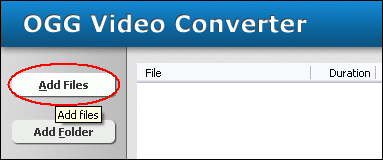WAVE64 to OGGConvert WAVE64 to OGG, WAVE64 to OGG Converter |
 |
| Home | Getting Started | Download | Buy Now! | Screen Shots | FAQ | Support | Contact |
OGG Video Converter converts WAVE64 files to OGG format easily and quickly. The software is an ALL-IN-ONE audio converter that supports more than 100 audio and video files. OGG Video Converter supports batch conversion, and is full compatible with 32-bit and 64-bit Vista and Windows 7.
 Click "Add Files" to choose WAVE64 files and add to conversion list.  Choose one or more WAVE64 files you want to convert and then click "Open". OGG Video Converter will open the files and get information such as width, height, frame rate, video bit rate, audio sample rate, audio bit rate, audio channels, and then list the information at conversion list. 

 Click "Convert" to convert WAVE64 files to OGG format.  The software is converting WAVE64 files to OGG format.  Right-click converted WMA file and choose "Play Destination" to play the outputted WMA file; choose "Browse Destination Folder" to open Windows Explorer to browse the WMA file. What is WAVE64? The Sony Wave64 file format is defined as a true 64 bit file format that allows to overcome the limitations of the RIFF/WAVE format. The file format was originally defined by Sonic Foundry. In Summer 2003, Sony Pictures Digital acquired Sonic Foundry's Desktop Software assets. Since then, the new format is officially promoted as Sony Pictures Digital Wave 64. Companies are encouraged to support this format and no royalties have to be paid to use it. The Sony Wave64 file format is very similar to the well known RIFF/WAVE format. Therefore, existing software implementations of RIFF/WAVE file filters are likely to be extendable to support the Sony Wave64 file format with little programming effort. Because of the similarities to the RIFF/WAVE format, only the differences between these formats are described. It is assumed that the reader is familiar with the original format as defined by Microsoft. What is OGG? The name "Ogg" refers to the file format which can multiplex a number of separate independent free and open source codecs for audio, video, text (such as subtitles), and metadata. In the Ogg multimedia framework, Theora provides a lossy video layer, while the music-oriented Vorbis codec most commonly acts as the audio layer. The human speech compression codec Speex, lossless audio compression codec FLAC, and OggPCM may also act as audio layers. The term "Ogg" is commonly used to refer to audio file format Ogg Vorbis, that is, Vorbis-encoded audio in the Ogg container. Previously, the .ogg file extension was used for any content distributed within Ogg, but as of 2007, the Xiph.Org Foundation requests that .ogg be used only for Vorbis due to backward compatibility concerns. The Xiph.Org Foundation decided to create a new set of file extensions and media types to describe different types of content such as .oga for audio only files, .ogv for video with or without sound (including Theora), and .ogx for applications. Because the format is free, and its reference implementation is non-copylefted, Ogg's various codecs have been incorporated into a number of different free and proprietary media players, both commercial and non-commercial, as well as portable media players and GPS receivers from different manufacturers. Convert WAVE64 to OGG Related Topics: ROQ to OGG, QT to OGG, OGV to OGG, PSX to OGG, VMD to OGG, WMD to OGG, 3GPP to OGG, VFW to OGG, MPA to OGG, MKA to OGG, EVOB to OGG, MPGA to OGG, M1V to OGG, VID to OGG, 3G2 to OGG, SWF to OGG, QCP to OGG, ADTS to OGG, M2TS to OGG, OGA to OGG, DAT to OGG, M2A to OGG, STR to OGG, OGX to OGG, OGM to OGG, F4B to OGG, DV to OGG, ALAC to OGG, DNXHD to OGG, XA to OGG
|
| Home | Getting Started | Download | Buy Now! | Screen Shots | FAQ | Support | Contact | Links |
| Copyright © 2007-2014 Hoo Technologies All rights reserved. Privacy Policy |